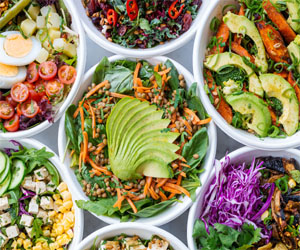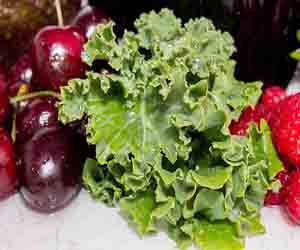


A Key To Health And Enjoyment

Food variety is an essential element of a balanced and enjoyable diet. It encompasses a wide range of foods from different food groups, offering diverse flavors, textures, and nutrients. While the importance of a varied diet is often emphasized for nutritional benefits, it also plays a crucial role in promoting healthy eating habits, culinary adventure, and overall well-being.
Nutritional Balance: One of the primary advantages of consuming a variety of foods is the achievement of a balanced and nutritious diet. Each food group brings a unique set of essential nutrients to the table. By incorporating a broad range of foods, you are more likely to meet your nutritional needs, ensuring that your body receives an ample supply of vitamins, minerals, carbohydrates, proteins, and fats. This diversity is vital for maintaining energy levels, boosting the immune system, and supporting overall health.
Preventing Dietary Deficiencies: A monotonous diet that lacks variety can lead to nutritional deficiencies. For instance, relying solely on a narrow selection of foods may result in inadequate intake of specific nutrients like vitamin C, calcium, or fiber. Over time, such deficiencies can contribute to health problems. By diversifying your diet, you reduce the risk of missing out on these critical nutrients.
Enhancing Taste And Satisfaction: Food variety doesn't just benefit your health; it also elevates your culinary experience. A diet rich in diverse flavors and textures can make every meal a delightful adventure. Savoring different foods stimulates your taste buds and keeps meals exciting and enjoyable. It can prevent food boredom and discourage overindulgence in less nutritious, but more familiar, options.
Cultural Exploration: Exploring a variety of foods exposes you to different culinary traditions and cultural practices. This exploration can be a delicious way to learn about diverse cultures, fostering a deeper appreciation for the richness and diversity of the world. It also encourages an understanding of the importance of cultural food heritage.
Diverse Nutritional Profiles: Different foods have different nutritional profiles. For instance, leafy greens provide a wealth of vitamins and minerals, while whole grains offer fiber and sustained energy. Lean proteins like fish and poultry are rich in essential amino acids. By incorporating all of these into your diet, you ensure a holistic approach to nutrition that supports all aspects of health.
Dietary Flexibility: A diet rich in food variety allows for greater flexibility. It accommodates individual preferences, dietary restrictions, and specific health needs. If you have dietary restrictions or health conditions, you can still enjoy a diverse diet by selecting from foods that fit within your parameters.
Practical Tips For Embracing Food Variety:
Plan Weekly Menus: Planning your meals in advance can help ensure a variety of foods are included.
Experiment With Ingredients: Try new ingredients and recipes regularly. Be open to exploring different cuisines.
Shop Seasonally: Buying fruits and vegetables that are in season is a great way to ensure variety in your diet.
Rotate Protein Sources: Vary your protein sources, including plant-based options like beans and tofu, lean meats, and fatty fish.
Moderation And Balance: Embrace the principle of moderation. While variety is important, it's also essential to consume foods in appropriate portions.
Food variety is a cornerstone of a wholesome and enjoyable diet. It contributes to balanced nutrition, promotes health, and makes meals an adventure in flavor and culture. Embracing diverse foods can improve your overall well-being while turning each meal into a delightful journey of taste and exploration.




A World Of Perfection In A Tiny Cup
 For an espresso aficionado, the journey begins with selecting the finest coffee beans. They meticulously examine the origin, variety, and roast level, knowing that these factors will greatly influence the resulting shot. It's not just about caffeine; it's about the nuances and subtleties in flavor. Beans from Ethiopia offer a different experience than those from Colombia, and an espresso aficionado savors each distinctive profile.
For an espresso aficionado, the journey begins with selecting the finest coffee beans. They meticulously examine the origin, variety, and roast level, knowing that these factors will greatly influence the resulting shot. It's not just about caffeine; it's about the nuances and subtleties in flavor. Beans from Ethiopia offer a different experience than those from Colombia, and an espresso aficionado savors each distinctive profile.
Grinding the beans is a science in itself. The grind size must be just right, neither too fine nor too coarse, to achieve the perfect extraction. Precision is key, and aficionados invest in top-notch grinders that allow for minute adjustments. They know that a slight tweak can transform a mediocre shot into an exceptional one.
The espresso machine is their prized possession. It's a piece of equipment they've researched extensively, chosen carefully, and maintain lovingly. Every aspect of the machine, from the water temperature to the pressure, is controlled with meticulous care. Brewing an espresso shot is a performance, with the barista as the conductor and the machine as the orchestra.
A Tapestry Of History, Diversity, And Tradition
 Cuisine And Culinary Traditions: Mediterranean cuisine is renowned worldwide for its health benefits and delicious flavors. It reflects the region's emphasis on fresh, seasonal ingredients, such as olive oil, fruits, vegetables, legumes, and grains. Dishes vary from country to country, but common ingredients and culinary techniques, such as grilling, roasting, and the use of aromatic herbs, unite the Mediterranean palate. Meals are often shared with loved ones, emphasizing the social aspect of dining.
Cuisine And Culinary Traditions: Mediterranean cuisine is renowned worldwide for its health benefits and delicious flavors. It reflects the region's emphasis on fresh, seasonal ingredients, such as olive oil, fruits, vegetables, legumes, and grains. Dishes vary from country to country, but common ingredients and culinary techniques, such as grilling, roasting, and the use of aromatic herbs, unite the Mediterranean palate. Meals are often shared with loved ones, emphasizing the social aspect of dining.
Art And Architecture: Mediterranean culture has produced some of the most stunning and enduring works of art and architecture. Greek and Roman architecture have left indelible marks on the region, and medieval influences can be seen in the cathedrals and fortresses of coastal towns. Iconic artistic traditions like mosaic work, painting, and pottery continue to flourish in Mediterranean communities.
Language Diversity: The Mediterranean region is a linguistic mosaic. Numerous languages, dialects, and scripts are spoken and written throughout the region, reflecting its rich cultural diversity. Arabic, Greek, Italian, Spanish, and Turkish are just a few of the languages spoken in Mediterranean countries.
A Journey To Wholesome Eating
 3. Sustainability: Real food is often closely linked to sustainable and ethical agricultural practices. By choosing real food, consumers can support responsible farming and contribute to a more environmentally friendly food system.
3. Sustainability: Real food is often closely linked to sustainable and ethical agricultural practices. By choosing real food, consumers can support responsible farming and contribute to a more environmentally friendly food system.
4. Nutrient Density: Real food is inherently rich in essential nutrients, vitamins, and minerals. It offers more nutritional value per calorie, making it a sensible choice for those looking to optimize their diets.
The Benefits Of Real Food:
Consuming real food offers numerous benefits, including:
1. Nutritional Value: Real food is packed with essential nutrients, providing a wealth of vitamins, minerals, and antioxidants that support overall health.
2. Weight Management: Real food is often lower in calories and higher in fiber, promoting satiety and aiding in weight management.
3. Better Digestion: The fiber in real food supports healthy digestion and helps maintain a balanced gut microbiome.






Health And Dietary Considerations
 Health Benefits
Health Benefits
For individuals with celiac disease or gluten sensitivity, adopting a gluten-free lifestyle is non-negotiable. Consuming gluten can lead to severe health consequences and discomfort. However, even for those without these conditions, there are potential health benefits to going gluten-free.
Some people report improved digestion, increased energy, and reduced gastrointestinal discomfort when they eliminate gluten from their diets. This could be attributed to the fact that many gluten-containing foods are also highly processed and high in refined carbohydrates. A gluten-free diet can encourage individuals to choose more whole and naturally gluten-free foods like fruits, vegetables, lean proteins, and legumes.
Potential Drawbacks
While the gluten-free lifestyle offers various benefits, it's essential to be mindful of potential drawbacks. A gluten-free diet can be challenging to maintain, as gluten is pervasive in many common foods. Additionally, gluten-free products can be more expensive, and some may lack essential nutrients like fiber and certain vitamins.